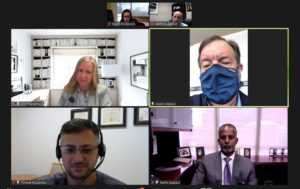UAMS Staff Collaborate to Hold Virtual Training for Medical Students’ Transition to Intern Practice
| UAMS turned its annual Rising Intern Preparation Week into a virtual affair this year in order to prepare the entire fourth-year medical student class for intern life.
Typically, UAMS holds Rising Intern Preparation Week in late April. Last year, when COVID-19 arrived in Arkansas six weeks before the training was set to occur, organizers had no option but to cancel the event because of social distancing rules.
This year, with the help of representatives across UAMS, the annual event was transformed into a virtual learning experience.
“It truly was a TeamUAMS effort with about 20 faculty members from the departments of Surgery, Emergency Medicine, Neurology, Cardiology, Anesthesia and Nursing all involved along with the UAMS Centers for Simulation,” said Karen J. Dickinson, M.D., assistant professor of surgery, director of interprofessional simulation and clinical skills training.
Expert faculty panelists included Holly Naramore, director of the project coordination office; Rawle Seupaul, M.D., chief clinical officer; Ahmed Abuabdou, M.D., associate professor in the Department of Internal Medicine; and C. Lowry Barnes, M.D., professor and chair of the Department of Orthopaedic Surgery.

Those participating in the expert faculty panel included (left to right, top to bottom) Karen J. Dickinson, M.D., and Matthew Spond, M.D.; Holly Naramore; C. Lowry Barnes, M.D.; Ahmed Abuabdou, M.D.; and Rawle Seupaul, M.D.
Dickinson organized the training with Matthew Spond, M.D., associate professor of anesthesiology, and Veronica Ussery, BBA, who translated the event to a virtual platform. Others providing invaluable expertise and assistance included the entire UAMS Centers for Simulation staff and four simulated patients (members of the public trained by Sherry Johnson to pretend to be a patient).
“We simulated interactions the interns could feasibly encounter during their first week of internship,” Dickinson said. “For the trauma simulation, we played a video of an “ideal” trauma activation, written and directed by Dr. Joseph Margolick, assistant professor of surgery, for them to study and discuss.”
The weeklong training included advanced cardiac life support teaching (delivered by Susan Robertson and Angela Duncan), five virtual panels delivered in a webinar format with Q&A and virtual simulations in Zoom breakout rooms. By the end of the training, the students had rotated through five different patient situations and learned more about optimizing a patients’ length of stay in the hospital.
“The virtual Rising Intern Preparation week activities fostered confidence in our ability as senior medical students to transition into residency,” said attendee Johnathan Williamson, 25, who starts his pediatrics residency at UAMS and Arkansas Children’s in July.
Planning for the event began in December 2020 with Dickinson and Spond meeting weekly. Dickinson trained the faculty via zoom in separate groups for each of their simulation scenarios while she, Spond and Ussery rehearsed the webinar and breakout room platforms to troubleshoot any technology issues. The three also held several planning meetings with UAMS Centers for Simulation staff including Travis Hill, Margaret Glasgow, Sherry Johnson and Andrew Warr.
“We all had to change our mindset slightly and think in a new and innovative way,” said Ussery. “Learning the zoom webinar feature was a slight learning curve as well as figuring out the best process for moving people in and out of breakout rooms for the virtual simulation.”
“The biggest challenge was translating such a large event from in person to a virtual platform with multiple moving parts, including equipment, technology, faculty, learners and simulated patients,” Dickinson said. “We have been using online education for more than a year during the pandemic but delivering high-quality education on such a large scale with so many elements, including didactics and simulations, was a daunting task,” she said.
The training featured a collaboration of several specialties and professions to ensure that the graduating College of Medicine students were as prepared for their intern year as possible during these challenging times.
“We hope we have imparted a little more confidence, a little more preparation to the graduating M4 Class from the UAMS College of Medicine as they enter their post-graduate clinical training,” Spond said.
Dickinson said that in addition to the obstacles, there were also some advantages, including greater accessibility to the students.
“We were able to involve all of the students, whether they were at home, had already moved to their new state or were in the hospital,” she said, adding that the virtual platform or a hybrid approach of in person and virtual options is a possibility moving forward.
“We remain uncertain about the exact path out of this pandemic,” she said. “Whatever the future holds, we now know we can successfully provide this important intern preparation week virtually to all our fourth-year medical students.”
